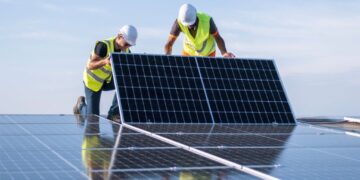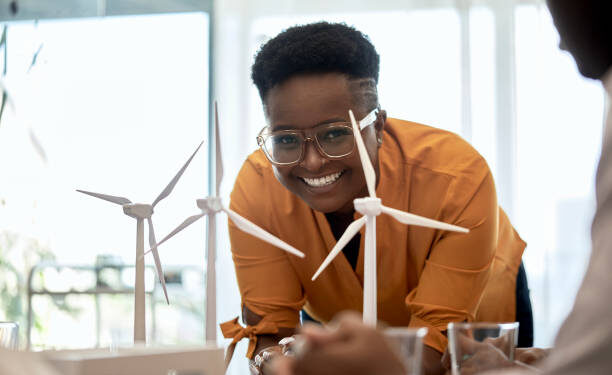A new report has highlighted the need for increased gender focus in Nigeria’s electrification sector – both in designing and implementing electrification projects that target women and the vulnerable population, as well as mainstreaming women in professional roles across the electricity industry.
The WOMEN IN RENEWABLE
ENERGY BASELINE
Report 2021 by the Renewable Energy Association of Nigeria, REAN stated that ’ that women are currently more placed in administrative and non-STEM duties within organizations, than technical roles.
According to the report obtained by The Energy Intelligence, most women highlighted a male dominance of the sector and work-life balance as major barriers for them, followed by finding the right mentorship opportunities and getting field exposure in renewable energy roles. It added that female students in universities are enrolled on more non-STEM courses.
“This percentage represents the average share of women in renewable energy and was found to be 33 per cent.
This suggests that for every renewable energy company with 100 staff, there are about 30 women. Out of this share, women in non-STEM roles were highest at 64 per cent, followed by 28 per cent in administrative positions. The share of women in STEM roles was the least at 8 per cent.
This also means that out of the 30 women, 19 will be in non-STEM roles, 8 women in administrative positions and 3 women may be in STEM roles.
The results agree with an earlier assumption from the results of the individual survey that women are currently more placed in administrative and non-STEM duties within organizations, than technical roles,” it added.
Attracting Investment
It stated that lesser women involvement in the energy space in Nigeria compared to their male counterparts, and less developed capacity of usually smaller women-owned enterprises in being able to raise investment are why investments in women-owned renewable energy companies are much lesser than their male counterparts.
It added that with the right technical support in building their capacity and investment readiness, more women-owned and women-led companies will be able to attract investment and funding.
Gender Mainstreaming
“Companies must take intentional steps in not just integrating gender provisions in their company policies where such exist but putting in place measures that implement these gender provisions.
There should be specific targets for gender inclusion in the company at junior, mid-level, and senior positions. Guidance can be provided by the industry association in setting minimum gender criteria or policy for its member companies which member companies can adapt and build on to fit their company standards.
There are areas of gender improvements required in the national renewable energy policy and strategy documents, primarily in clearly outlining targeted programs to ensure gender inclusion in the renewable energy industry including mandating gender inclusion in organizations.
There also needs to be a means for comprehensive and effective monitoring and evaluation of the policy to track progress on gender inclusion. There is already progress in this area.
On 4 June 2017, at the 51st Ordinary Session of the Authority of Heads of State and Government of ECOWAS, held in Monrovia, Liberia, the Heads of State of the Economic Community of West African States (ECOWAS) adopted the ECOWAS Policy for Gender Mainstreaming in Energy Access, through a Supplementary Act amending the ECOWAS Treaty.
The Policy aims to address barriers to the equal participation of men and women in the expansion of energy access in West Africa.
It establishes gender dimensions and their considerations in energy interventions to achieve West Africa’s energy access goals. Currently, the Nigerian government through the Ministry of Power is developing a National Action Plan to implement the ECOWAS Policy for Gender Mainstreaming in Energy Access.
The National Action Plan aims to set out the 5-year strategy by which the country will meet its national obligations, as specified in the Supplementary Act adopting the ECOWAS Policy and addressing gender gaps and challenges in the sector improving gender inclusion. Companies through the industry association can collate and share data and information with the government to support the implementation of the Action Plan.
Lastly, targeted technical support for women-owned businesses in building their capacity and investment readiness will improve investment flow to these companies. Efforts need to be increased in encouraging more women-led businesses and start-ups in the sector, and provision of technical support in developing their capacity and investment readiness.
Organizations such as All On and the Clean Technology Hub are providing incubation support for clean energy enterprises in the sector while USAID Power Africa is providing technical training for women-led businesses.
However, more of such efforts will be required to increase the level of investment flow to women-led businesses in the sector,” the report stated.























